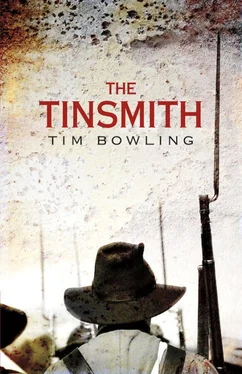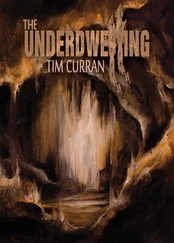“Baird, we have work to do.” Rawley turned and stomped off.
After a last wondering look at the dead man, Anson followed.
At his back, he heard the young major give orders for the body and horse to be left.
Once again, Anson resumed his operating. Somehow the murder renewed his strength, made his commitment to life even stronger, his sense of duty to the Union even more important. Certainly the daylight improved the accuracy of his incisions.
Even so, the tall soldier’s reappearance early in the morning reassured him.
“Ah, John,” Anson said cheerfully. “Come to lend a hand again? Good man.”
The soldier’s face hovered in the air, the cheeks, brow, and jaw blackened with dirt, no doubt from burial detail.
But the detail must have rattled him, for his composure was gone. His large hands trembled, he glanced up regularly in alarm, and he did not speak at all. From time to time, he lightly touched the wound on his cheek and paused, as if remembering something. His lips were flecked at the corners with dried spittle and he kept holding his bare forearms out before him and turning them slowly over, as if searching for a wound that hadn’t broken the skin. But he helped as best he could when called to it, and Anson was generally too preoccupied to worry over the tall soldier’s altered behaviour.
• • •
The morning of the 19th proved very fine, clear and warm. Most of the able-bodied troops had assembled in readiness for an advance or attack, but that still left a small army of wounded in the tents and farm buildings and on the ground near the operating tables. Along with everyone else, Anson learned of the enemy’s departure from the field. The marching and wheel-grinding audible through the night and past daybreak were exactly what they sounded like—a retreat. But Anson did not know whether that meant victory for the Union—he could hardly think so, given the carnage. Nonetheless, the retreat encouraged him. The last thing he needed was a fresh supply of wounded.
A pungent, putrid smell of rot consumed the day. The thousands of dead soldiers still lying in the field bloated and turned black. Their bowels emptied. And since most of the men also suffered with Anson’s malady, the air became diarrheic, thick and foul enough to seem almost solid. The civilian onlookers soon retreated—at least most of the fine ladies and gentlemen picnickers did—those who had crowded the hillsides to watch the battle two days before.
But when Anson, unable to sleep and unable to remain amid the suffering, again headed for the large tree on the horizon, he noticed that other civilians had embarked on work of their own. He stopped a short man in a bowler hat rifling the pockets of a dead Union soldier.
“You! What are you doing there?”
The man straightened up, his white-gloved hands empty. He grinned wolfishly, then dabbed a lace handkerchief to his nose.
“The smell is very loud today, sir. Very loud, indeed.”
Anson looked at the dead soldier. His young face was almost coal-black. A mass of flies crawled over his smashed torso. The boots had been removed from his feet.
“What were you doing to this man?” Anson tried to put anger into his voice, but the effort left him spent. He barely maintained his balance.
“Oh, I was touching him only in his service, I assure you. He might be one of the sensible ones with a coupon, you see.”
“A coupon?”
The man lightly brushed a fly away from his pink mouth and pointed to an ordinary-looking wagon a short distance behind him. His reedy voice carried an odd mixture of enthusiasm and pride. “For the embalming. If he had possessed the foresight, for the sake of his loved ones back home, to have purchased one of Mr. Greaver’s coupons, then his corpse would have been preserved and shipped home in a lovely zinc-lined coffin.” He kicked at the body, raising a handful of flies. “But alas, he did not avail himself of the opportunity when it was presented to him. Others, no doubt, were wiser, more considerate of their families.”
Anson followed the man’s gaze over the rolling, ravaged fields. Clusters of negro contrabands were busily recovering corpses for burial. A few dozen feet away, a long line of dead Union soldiers appeared like a festering snake on the torn ground. Two civilians stood over them. Some kind of black apparatus—like a survey tripod, only bulkier at the top—was set up nearby, a few feet from a delivery wagon draped in a tarp. Anson recognized the burly, bearded Scotsman from earlier. What had he said he was? A photographer?
Remembering daybreak’s runaway horse, Anson turned and walked back in the direction of the barnyard. It took him several minutes to find the spot. When he did, he discovered that the mutilated corpse was gone, though the charger remained in its gentle kneeling posture, its flanks and head swarming with flies, their buzzing as loud as bee-hum. Anson wondered if the Scotsman had taken the study he’d wanted. Sadly, he knelt and stared into the horse’s face. Somehow its closed eyes seemed dimly alive with terror still. No doubt some investigation of the murder would follow, now that the Rebels had retreated. Anson breathed deeply and the effort set off another violent bout of coughing. He raised his hands to his mouth. His own blood mixed again with the dried blood and pus of the hundreds of wounded he’d tended over the past two days.
When he recovered, Anson sensed that he was not alone. He stood and, looking through watered eyes, saw the blurred image of a soldier. In a few seconds, the image solidified.
“John?”
The soldier said nothing, merely stared hard at the air. Though blood had spattered his face and his torn uniform resembled a splotch of stains, something more than fatigue and sadness haunted his eyes, something Anson knew he did not feel himself. It wasn’t fear, but an unequivocal plea for assistance.
“Is there something wro…”
Before Anson could finish the question, two officers rode up swiftly. The older man, a sergeant with a spare, dark face and a neat goatee, dismounted carefully, as if exiting a rowboat. Bloody muslin bandages swathed his right shoulder. He grimaced as he studied the ground around the charger. Then he said something inaudible to the younger man, an unwhiskered, red-cheeked lieutenant who immediately swung down from his horse with fluid ease.
“I did leave orders, sir. Obviously they weren’t followed.”
The sergeant turned.
“What do you men know about this?”
Anson wiped sweat off his forehead with the back of his hand. “Sir?” His voice came out in a croak.
“There’s supposed to be a body here. Of a civilian. He’d been killed in a…” The sergeant paused, as if aware of the absurdity of his forthcoming phrase, under the circumstances. “In a gruesome fashion.” His eyes roamed the field briefly. He cleared his throat and spat.
“It was here,” Anson said. “This morning.”
“Hell, I know that. But why isn’t it here now?”
“Perhaps a burial party picked it up,” the lieutenant said.
The sergeant grunted. “Christ. As if I don’t have better things to do than to care who killed a goddamned farmer who was fool enough to stay around here during a fight. Have his niggers been rounded up, at least?”
The lieutenant nodded.
“Probably some reb killed him for his boots. They sure as hell didn’t leave any on our boys.” The sergeant squinted hard at the tall soldier. “Are you wounded, son?”
“He’s on medical detail,” Anson said quickly. “I’m a surgeon.”
The sergeant frowned.
“After the battle,” Anson continued. “During it, he brought many wounded into my aid station from the front lines.”
“Is that so?” The sergeant appraised the tall soldier coldly from head to foot. “That’s the best fit they could find for you, is it?”
Читать дальше












